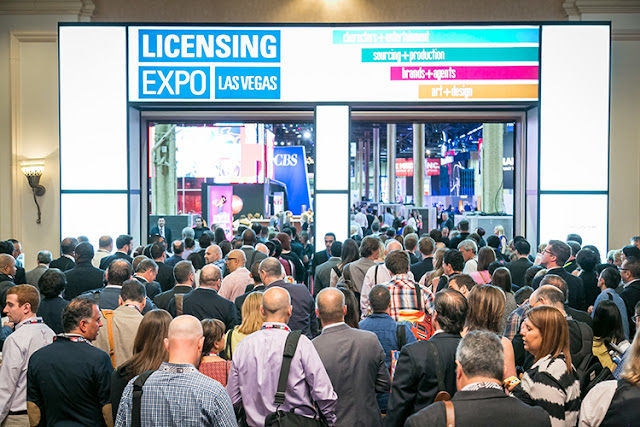Hello friends and welcome to my 8-part blog mini-series unboxing
what I believe are key factors to consider when you are thinking about pursuing
entertainment for your brand/franchise. I’m posting these factors as weekly mini-posts
to help break down this complex subject into bite-sized ideas.
Observations from Licensing Show.
 |
| Crowds at 2016 licensing show |
Very recently I attended the 2016 LIMA event in Las Vegas
this year for four full days. It was perhaps the most energetic and well
attended licensing show so far. There
were many trends and noteworthy observations to be made, but for me, the most
interesting amongst them was the absolute explosion of brands and companies of
all sorts that were considering, or committed to, creating entertainment for
their brand.
This entertainment and character gold rush is understandable
when one looks at the continual growth and success of character and
entertainment licensing in general. What’s driving all of this? The audience: Millennial families in particular, are increasingly making stories they love,
part of their own ongoing stories and lives.
There’s a lot that’s new in just that one statement but this
8-part blog series is going to focus on what I believe are some important
understandings that any brand exec, manager or creator should know if they are
considering creating entertainment for their brand.
Note: For those who are interested in a much deeper dive
into Millennials and Gen-Z, we are hosting an all day seminar on October 28th
in Newport Rhode Island to share those deeper insights and understandings on
the subject.
Click here for Seminar information
8 Things You Should Know about Entertainment For Your Brand:
1.) Be sure that entertainment
is the best answer for your brand.
Not all brands should have
entertainment developed for them. For
brands today, success comes from delivering EXPERIENCES through your product or
franchise that help your audience to discover and become more of who they want
to be. This is as true for watching TV, going to a movie, or eating at a
restaurant, as it is for playing with a video game or toy or wearing licensed
clothing.
An entertainment story is one way to achieve inspiring
aspirational change in your audience but it is by far not the only way to do
so.
A well conceived and innovative brand re-imagining that engages the
consumer/audience with compelling experiences that can grow into a relationship
can often be delivered through innovative products and plans that clearly
deliver that benefit.
 |
| the Art of Shaving Store and Experience |
As an example, visit any of the growing number of “The
Art Of Shaving” stores. When a guy enters the store, you become inspired by
product, message and experience (even getting a shave), to become more of the
kind of successful guy you’d like to be through grooming that connects you to
the generational beard-tribe through shaving.
 |
| Old technology made relevant by the brand story |
They also get you to drop $250 on
100-year-old shaving technology proving that there is no such thing as old,
only irrelevant…and they are relevant! They achieve this without entertainment
or spokes-characters by delivering a rich and deep internal narrative
experience.
Net/net, transformative experiences that build to a
relationship are the key and entertainment is only one form of transformative
experience.
It’s also important to note that there is a very, very,
significant cost associated with developing entertainment. Putting a fraction
of that cost into your brand/franchise work and developing experience-based
engagement can sometimes have an equally large, or larger and longer lasting
impact than entertainment.
Here’s some gating questions to establish if your brand is a
good candidate for entertainment development.
- In what way does your brand help your audience to change themselves in positive ways and is entertainment the most powerful way to inspire that change?
- Is your brand’s business presently based on character affinity and if not, should it be? Story and character can’t artificially make product and services important unless they are fundamentally and organically important to the telling of that particular human story. Making a story just as a vehicle for product placement dilutes the story and can alienate your audience.
- Does the entertainment you are considering pursuing drive more than a single category of product to justify the profound time and money investment that will be needed?
- Do you have the financial depth to properly fund the entertainment and ongoing story relationship you will begin with your audience and/or do you have a brand with powerful enough equity to attract an entertainment partner?
This ongoing series will unbox those questions and other
factors each week.


No comments:
Post a Comment